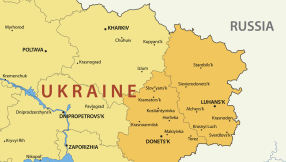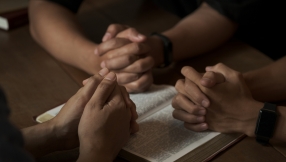
Is God in some way behind the current coronavirus pandemic? Is He sending us all a warning? Or is it just an example of life being out of control in a world full of problems?
It may not surprise you to know, dear reader, that with many people confined to their homes but having easy access to the internet, some of these questions have been passionately (even heatedly!) debated online over the last few days. Fortunately, we're here to solve all your knotty theological problems definitively, clearly, and in just a few hundred words. Or something like that...Ok, well if not quite all that, then at least to get you thinking.
So how indeed might we approach the question 'does God cause pandemics?' – and other related issues?
1. With the Bible
That's how Christians always do theology because we believe it is the authoritative written word of God. So, does God initiate pandemics? Well, Exodus 32v35 and 1 Samuel 24v15 give us two pretty clear examples of the Lord doing exactly that. And in the final book of the Bible we read of God 'having control' of plagues (Revelation 16v9). So the short answer to the question is, 'yes, He may cause pandemics'. But this is not all we will want to say.
2. With Christians who have gone before us
We'll want to think about these things with the wisdom of past Christian thinkers, especially when there is a broad consensus among them.
Theologian John Chrysostom (347-407) states: 'The providence of God everywhere directs all things according to its own wisdom' and 'all things are ordered by the providence of God, who, for reasons known to Himself, permits some things and actively works others'.
With even natural disasters we should thus not 'be despondent, but worship Him who caused them'. And that is fairly much mainstream Christian thinking from the time of the early church fathers onwards.
Rightly understood, the doctrine of providence - God's constant care of us - is one of the most practical, comforting and helpful in Scripture, and can be so even in the face of horrific situations, as one abuse survivor testified in recent years.
This raises all sorts of further questions, of course. To what extent does God order all things, when it 'feels' as though humans make 'free' choices? Does God micro-manage every detail, or set broad parameters within which there can be a bit of 'flexibility'? How does it work?
Theologian J.I. Packer says that while 'a person takes action, or an event is triggered by natural causes, or Satan shows his hand – yet [somehow] God over-rules'.
At the same time, Packer says, exactly how He 'makes His will of events come to pass [...] without violating the nature of things, the ongoing causal processes, or human free agency is mystery to us [...] but consistent Biblical teaching'.
And this mystery leads us to the third point.
3. With caution
We must be cautious about trying to explain why God allows particular pandemics or hardships at particular times. It's true that Jesus sometimes gives his disciples a specific explanation of the providence of God. Thus one blind man's affliction is not due to his sin but 'happened so that the works of God might be displayed in him' (John 9). Yet another man's disability does seem somehow linked to his sin (John 5v1-14).
However, we lack the divine knowledge of Jesus. And he cautions us against trying to read providence (to say exactly what God is up to at any one time, and why) more closely than we actually can – especially in the context of disasters.
Once, when discussing the collapse of a tower (Luke 13v1-5), Jesus says his hearers should respond not by speculating on the sins of those who died underneath it – but by repenting of their own sins. Job's 'comforters' analysed Job's suffering but had no idea what actually, in the providence of God, was going on (Job 1v6-2v10).
Martin Lloyd-Jones cautions us against interpreting providence too specifically, citing mistaken views of German evangelicals about Hitler in the 1930s.
While 'the doctrine is plain and clear,' he writes, 'always be careful in your application of any particular event.'
Thus it is wise to be cautious about trying to shoe-in the coronavirus pandemic into a specific timeline of apocalyptic events, or trying to be over-precise about what sins in society it may somehow be linked with. Rather, we should first and foremost repent of our own sin as Jesus urges us.
Equally, we should be cautious about over-simplifying things in the other direction. A few days ago Tim Gombis, from Grand Rapids Theological Seminary, declared that 'God is not in control' and that to say things like 'God is sovereign and in control of this situation' is 'not a faithful representation of how Scripture portrays God's sovereign kingship'.
But while God holds back from fully eliminating evil now in order to give more people a chance to repent (2 Peter 3v9), that does not mean He has abdicated His throne in the meantime.
Writers such as Stephanie Englehart have helpfully steered a much better balance than Gombis between the clarity of Scripture and our own limited perspective.
Ultimately, we cannot fully know how the coronavirus fits into God's hidden providence – nor should we expect to. But as one excellent summary of God's sovereignty and providence in the Bible puts it this way: 'When life feels out of control, it can be comforting to remember that we're never out of the sight of our Creator – and He never loses control.'
I believe this to be true, even in times of pandemic.
David Baker is a former daily newspaper journalist now working as an Anglican minister @Baker_David_A













